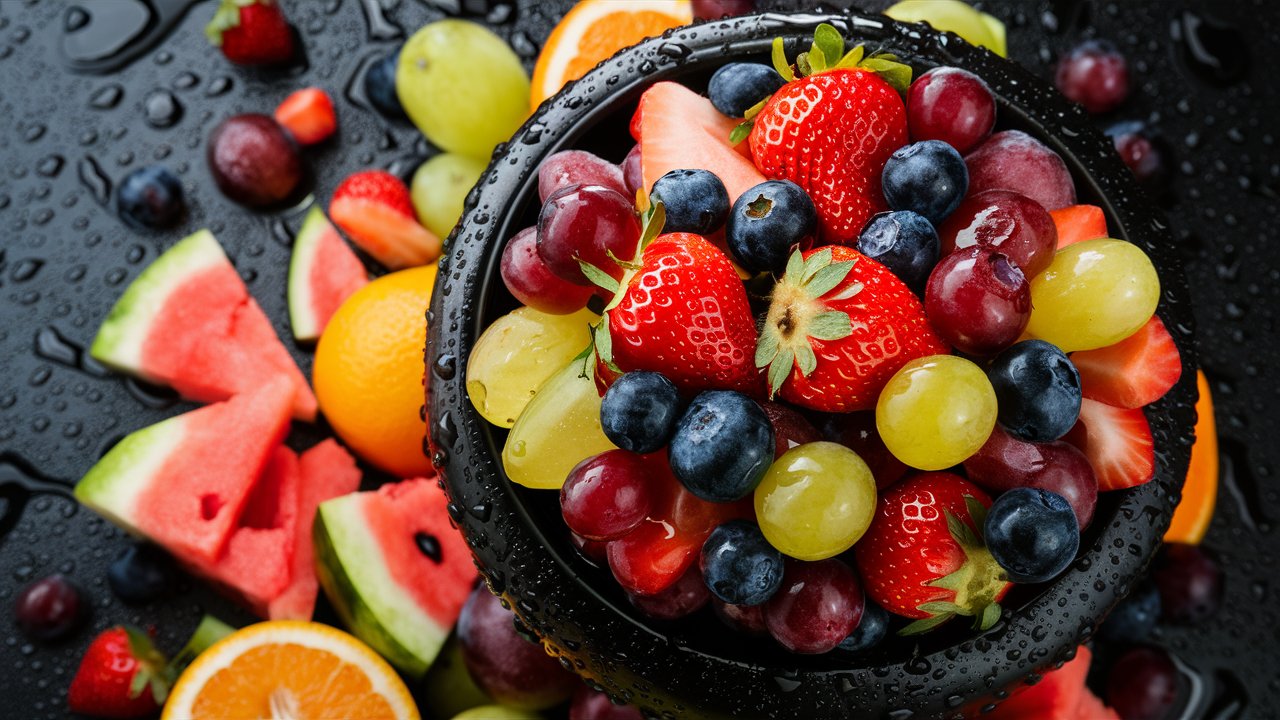It is often said that Intermittent Fasting is not about what you eat, it is about when you eat.
Does that mean you can eat whatever you want (and as much of it as you want) as long as you eat it during a specific time period?
Yes, it does…
And no, it doesn’t.
The majority of people who start fasting intermittently do so because they want to lose weight.
Meet my friend Ashley. Ashley weighs 110kg (240 pounds) and she has been on every single diet invented in the last forty years. She lost weight on all these diets and then put it all back on, with some to spare. She is now peri-menopausal and has discovered that this means that where in the past she could at least lose a few kilos whatever diet she started; this is no longer possible. She has severe insulin resistance and has just been diagnosed with type 2 Diabetes. Her doctor told her that her overeating caused her diabetes. The extra weight she carries on her delicate 1m66 (5.4 ft) frame causes her to suffer from near-constant back and knee pain. The pain is so bad that she cannot contemplate any form of exercise, not even swimming.
She saw on her medical file that her doctor had classified her as morbidly obese. She is so profoundly unhappy with her current weight that her doctor has had to put her on anti-depressants.
Feeling miserable, Ashley was desperately searching the internet for that one last miracle diet when she came across Intermittent Fasting, aka Time-Restricted Eating. She read story after successful weight loss story and was especially impressed by how many intermittent fasters were able to keep the weight off for months, even years after they started fasting. She watched this video:
At this point, Ashley was willing to try anything, even though she felt seriously intimidated by the idea of not eating, at all, for 16 hours every day. She went to see her doctor and discussed intermittent fasting with him. With his blessing, she decided she was going to give it a go because a 2018 review of intermittent fasting in obese people revealed that reducing calorie intake 1 to 6 days per week over at least 12 weeks enabled participants (mostly middle-aged women from the US and the UK) to reduce their weight with an average of 7 kilograms (15 lb.)
Ashley decided to start on a 16/8 (fasting for 16 hours and then eating for 8 hours.) She then had to figure out what she was going to eat during those 8 hours and what she would be allowed to eat or not eat during her fasting hours.
She researched the subject, by reading everything she could lay her hands on and came away completely confused. There seemed to be as many opinions about what to eat and what not to eat as there was hair upon her head (the hair she hasn’t pulled out yet in frustration, that is.)
Was it essential to eat a low-carbohydrate-high-fat or keto diet to lose weight while fasting intermittently, or could she really eat anything she wanted as long as she sticks to her 8 -hour eating period?
The short answer to that question, in my opinion, is yes…and no. During those 8 hours, Ashley still has to eat in such a way that she supplies her body with all the nutrients it needs. Anecdotal evidence has revealed that people who lose weight permanently while fasting intermittently look at it not as a temporary weight loss diet, but as a permanent lifestyle change. This means eating a healthy, balanced diet for the rest of their lives. So yes, she can eat whatever she wants without restriction as long as she eats healthily and no, she cannot eat whatever she wants if she wants to binge on chocolate for 8 hours every day.
Everyone is different. Some people initially lose weight while eating a carbohydrate-rich diet and later switch over to an LCHF or keto diet to get rid of further or the last few stubborn pounds. Other people do not lose weight unless they eat LCHF/keto right from the start.
Which brings us to what you can eat/drink during your fast. To benefit from autophagy, most experts agree now agree; you need to fast “clean.” Which means nothing but water (sparkling or still) and black tea or coffee — everything else has to be excluded. This was excruciatingly difficult for me, I am addicted to my first cup of coffee every morning, with a good dollop of (admittedly low-fat) milk in it. I just couldn’t get black coffee down. During the weeks I fasted “dirty,” I did continue to lose weight, but I wanted to benefit from autophagy, so I eventually made the painful switch to black coffee in the weeks before the operation. I now drink coffee with cream some mornings and black coffee on other mornings.
Ashley dived in at the deep end and started her 16-hour fast squeaky clean, with a normal diet during her 8 eating hours. Initially, for several weeks, she did not lose a pound, but encouraged by the support she received from others in the Facebook groups she joined, she stuck with it, and eventually, the pounds started to fall off.
Intermittent Fasting Food Guide: 10 Essential FAQs
Q1: What foods should I prioritise during my eating window to maximise the benefits of intermittent fasting?
A: Focus on nutrient-dense whole foods that provide sustained energy and support your body’s recovery from the fasting period. Prioritise lean proteins (chicken, fish, eggs, legumes), healthy fats (avocados, nuts, olive oil), complex carbohydrates (quinoa, sweet potatoes, oats), and plenty of vegetables. These foods help stabilise blood sugar, maintain muscle mass, and provide essential nutrients your body needs during the shorter eating timeframe.
Q2: Are there specific foods I should completely avoid while practising intermittent fasting?
A: While no foods are strictly forbidden, certain items can undermine your fasting benefits. Avoid highly processed foods, sugary snacks, refined carbohydrates, and excessive amounts of simple sugars during your eating window. These foods can cause rapid blood sugar spikes and crashes, increase cravings, and may trigger overeating. Also, avoid breaking your fast with large, heavy meals that can cause digestive discomfort.
Q3: Can I drink anything besides water during my fasting period?
A: Yes, but choose carefully. Plain water is ideal, but you can also have black coffee, plain tea (green, black, herbal), and sparkling water without added flavours or sweeteners. These beverages contain minimal to no calories and won’t break your fast. Avoid anything with calories, artificial sweeteners, cream, milk, sugar, or flavoured additives, as these can trigger an insulin response and technically break your fast.
Q4: What’s the best way to break my fast without causing digestive issues?
A: Start with something light and easily digestible. Good options include a small portion of fruit, a handful of nuts, or a small salad. Wait 30-60 minutes, then have your main meal. Avoid breaking your fast with large portions, very fatty foods, or high-sugar items, as your digestive system needs time to readjust after the fasting period. Listen to your body and eat slowly to gauge your comfort level.
Q5: Should I take supplements during intermittent fasting, and when should I take them?
A: Most supplements are best taken with food to improve absorption and reduce stomach irritation. Take fat-soluble vitamins (A, D, E, K) with meals containing healthy fats during your eating window. Water-soluble vitamins (B-complex, C) can be taken during fasting periods if they don’t cause stomach upset, though many people prefer taking them with food. Electrolyte supplements may be helpful during longer fasts, but consult with a healthcare provider for personalised advice.
Q6: How much should I eat during my eating window? Can I eat whatever I want as long as it’s within the timeframe?
A: While intermittent fasting doesn’t strictly limit what you eat, the quality and quantity still matter for optimal results. Aim to eat normally-sized, balanced meals rather than trying to cram excessive calories into your eating window. Focus on meeting your nutritional needs rather than compensating for the fasting period by overeating. The goal is sustainable, healthy eating patterns that support your overall wellness goals.
Q7: Are there foods that can help reduce hunger during fasting periods?
A: While you shouldn’t eat during fasting periods, certain foods consumed during your eating window can help reduce hunger the next day. Foods high in protein and healthy fats (like eggs, nuts, and avocados) provide greater satiety. Complex carbohydrates with fibre (like oats, vegetables) help stabilise blood sugar. Staying well-hydrated and ensuring adequate sleep also significantly impact hunger levels during fasting periods.
Q8: Can I consume artificial sweeteners or diet drinks during my fasting window?
A: This is debated among intermittent fasting practitioners. Technically, artificial sweeteners contain no calories, but some studies suggest they may trigger insulin responses or increase cravings in certain individuals. Many experts recommend avoiding them during fasting periods to be safe and to help reset your taste preferences. If you choose to use them, monitor how your body responds and consider eliminating them if you notice increased hunger or cravings.
Q9: What foods should I avoid in my eating window if my goal is weight loss?
A: Focus on avoiding calorie-dense, nutrient-poor foods that don’t provide satiety. Limit processed snacks, sugary drinks, refined grains, and foods high in added sugars. Be mindful of liquid calories from alcohol, smoothies, or specialty coffee drinks, as these can add up quickly without providing fullness. Instead, prioritize whole foods that provide protein, fiber, and essential nutrients to support your weight loss goals while keeping you satisfied.
Q10: How should my food choices change if I’m doing longer fasts (24+ hours) versus shorter daily fasts (16:8)?
A: For longer fasts, your refeeding approach becomes more critical. Start with smaller, easily digestible foods and gradually increase portion sizes over several hours. Bone broth, steamed vegetables, or small amounts of fruit are good starting points. For shorter daily fasts like 16:8, you can typically resume normal eating more quickly, though it’s still wise to start with something light. Longer fasts may also require more attention to electrolyte balance and should ideally be done under medical supervision, especially if you have any health conditions.
Making such a dramatic change in your eating habits can be difficult to maintain. I have created an Intermittent Fasting Retreat here in the south of France to help you persevere.
Disclaimer: While intermittent fasting has many potential and some evidence-based research-backed benefits, it remains a controversial way of eating. Before you make any changes in your eating habits, discuss your plans with your doctor, especially if you are on medication. People who should NOT fast include those who are underweight, have eating disorders like anorexia, are pregnant or breastfeeding, and people under the age of 18. The content of this story is for informational purposes only and are not intended to serve as a substitute for the consultation, diagnosis and medical treatment by a qualified physician or healthcare provider.

Ready to start again, stronger than ever before? This quiz will help you find out. It is not just about measuring where you are right now; it’s about shining a light on the areas of your life that feel meaningful, as well as those that might need attention. It’s an opportunity to reflect, recalibrate, and take steps toward a life that’s not only successful but profoundly fulfilling. Take The Quiz
I put the essence of who I am, and everything I have experienced that makes me who I am, with great enthusiasm, into my retreats, courses and books. – Dr Margaretha Montagu (MBChB, MRCGP, NLP master pract (cert,) Transformational Life Coach (dip,) Life Story Coach (cert) Counselling (cert,) Med Hypnotherapy (dip) and EAGALA (cert)


